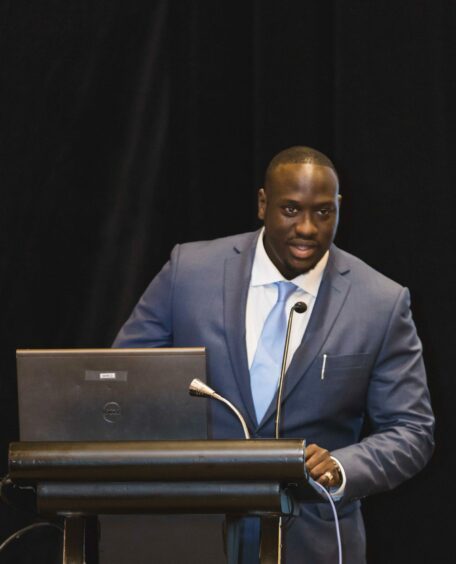 © Supplied by Anglo American
© Supplied by Anglo American Emerging markets will not be immune to the disruption caused by Russia’s invasion of Ukraine, but Africa brings positive signs of resilience.
I think emerging economies, particularly in Africa, are still the biggest macroeconomic opportunity out there at the moment. And people who might have been looking towards Africa and the potential returns from investment in its long-term future should think about developing partnerships there soon.
Even in a global energy crisis, there is a chance for growth. The International Energy Agency (IEA), which published its global oil market outlook report recently, estimates that Africa could replace one fifth of Europe’s gas imports from Russia.
Angola has seen a rise in inward investment into LNG and the recent establishment of a joint venture between BP and Eni, Azule, increases its clean energy pipeline. Algeria, Niger and Nigeria signed a memorandum of understanding with the EU indicating their willingness to build a new pipeline across the Sahara desert.
The IEA also said in its June report that investment in African energy has yet to recover from a plunge in energy prices in 2014. African economies have been hit hard by Covid too.
Longer term
But African countries are not just going to benefit from the current circumstances, they are going to thrive in the long term. The potential for African energy expansion is substantial.
True, African countries still need to find a way to take advantage of a potential boost in clean energy production in the short term. There is a shortage of capital, in particular private capital, being lent and invested in African growth at the moment.
Viable, creditworthy projects are starting to attract attention from the deepest pools of capital. Major LNG projects, such as Tortue off Senegal and Mauritania and Rovuma LNG in Mozambique, are lowering the overall cost of development.
It’s not just natural gas. African nations need to boost trade and GDP growth with major efforts to build new infrastructure – ports, roads and terminals – to allow for a more advantageous balance of global trade and payments. But if establishing financing in the development of emerging economies is a matter of time and the right local knowledge and connections, then this is the right time.
Demographic trends provide the long-term conditions for growth on the African continent. Over one fifth of the world’s under-35s live on the continent.
And, in the twenty years since the African Union was founded, the market conditions for growth have never been stronger than they are now – even in the face of Western stagflation – thanks to the establishment in 2021 of the African Continental Free Trade Area (AfCFTA).
Tackling emissions
This is not to deny that the ripple effect of the invasion of Ukraine is anything short of a crisis. Short-term investment in African energy supply might help alleviate our dependence on Russia in the short term, but it doesn’t solve everything.
And the Ukraine crisis has focused minds on a bigger, long-term challenge – diversifying global energy supplies – bringing us to the climate crisis and Africa’s role in the transition to sustainable energy and Net Zero carbon.
Globally, this transition will require the biggest capital reallocation in our lifetimes. It needs to start now.
The level of investment in infrastructure in emerging markets needs to increase several times over in order to bridge the global infrastructure finance gap, which McKinsey estimates is around $9.2 trillion per year between now and 2050.
That figure includes investment in new energy-generating capacity. Among the emerging markets, African countries have the biggest opportunity to harness solar energy generating capacity in particular. It is the most sun-rich continent in the world but it still has less than half of the installed solar photovoltaic capacity of the UK.
The growth of microgrids, as well as megaprojects such as the solar arrays powering nearly 40% of Morocco’s energy grid, show African economies are bypassing conventional energy supply and using sustainable resources to grow.
We know that a shortage of bankable projects in emerging markets can be overcome. Just look at how the Gulf has invested substantially in infrastructure in the last thirty years and substantially improved trade and industry networks. Ideas like freeports that were originally tried, tested and proven in the Gulf are now being used in the UK.
Taking the leap
We must imagine how Africa built by Africans for Africans in the 21st Century might look. To turn the shortage of viable projects around, what it takes is a combination of improved in-market knowledge and experience and the emergence of bigger domestic banking sectors in African markets.
Here in London, there is also capacity for financial innovation and alternative investment, including Shariah-compliant bonds and structured products that differ from traditional forms of debt and equity.
The Bank of England was one of the first central banks outside the Islamic world to raise foreign capital by issuing an Islamic bond, a Sukuk. Africa and the emerging markets stand to gain if more banks in global financial centres like the City can embrace the forms of finance that best suit projects in those markets.
Global events may seem gloomy but the sun is still shining in Africa and, if you are reading this, the chances are that you are in a good place to unlock the finance that the emerging markets need to thrive.
Tohib Iyiola is CEO of Stronghold Global Finance.

